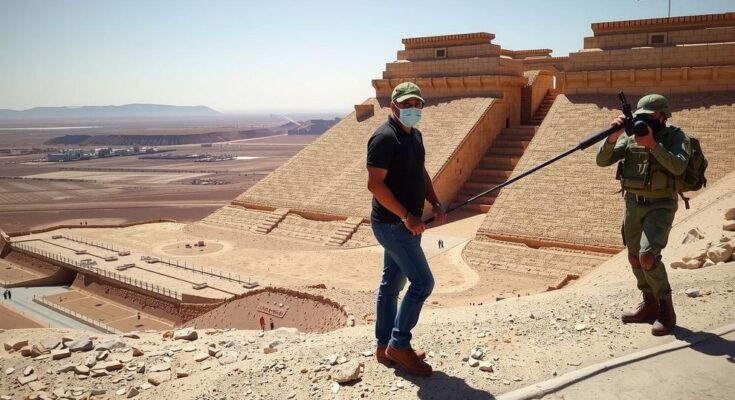Jordan is fostering diplomatic relations with post-Assad Syria to enhance border security, trade, and economic cooperation. Immediate engagements include discussions on returning Syrian refugees and addressing drug smuggling. Recent initiatives like the establishment of an inland port aim to facilitate trade and reconstruction efforts, while Jordan positions itself as a key player to support Syria’s recovery and stabilize regional dynamics.
Following the recent upheaval in Syria that saw the overthrow of Bashar al-Assad, Jordan swiftly moved to establish diplomatic relations with the new Syrian leadership. Jordan’s Foreign Minister, Ayman al-Safadi, was among the first officials to engage with Syria’s Ahmed al-Sharaa in Damascus shortly after the regime change. Subsequently, a Syrian delegation held further discussions in Amman, addressing crucial topics like border security, drug trafficking, energy supply, trade, and the repatriation of Syrian refugees.
In light of a shared 378 km border and mutual interests, both nations recognize the necessity of cooperation. Political analyst Monther al-Hawarat noted that Jordan’s involvement is crucial for Syria’s institutional reconstruction and energy provision. In return, Jordan hopes to rejuvenate its own economy through Syrian reconstruction initiatives, which could spur investment and expand trade and job opportunities.
Despite a drastic decrease in trade from $617 million in 2010 to just $146.6 million in 2023, Jordan has embarked on initiatives to enhance economic relations. The establishment of a new inland port in Mafraq was recently announced, aimed at facilitating logistics for reconstruction efforts in Syria. Economic experts assert that Jordan, bolstered by its transportation infrastructure and availability of essential materials, is well-positioned to play a key role in supporting Syria’s recovery. This includes potential contributions to the energy sector, with Jordan indicating readiness to supply Syria with significant electricity.
Furthermore, Jordan has prioritized border security to address concerns over arms and drug smuggling from Syria. While recent Syrian statements suggested improvements, military analyst Mamoun Abu Nuwar highlighted the complexities of restoring border security, given the multitude of armed groups across Syria. Although Jordan previously supported training efforts for US-backed factions, engaging with other groups poses significant challenges.
As Jordan navigates this new phase of relationships, the strategic partnership with Turkey, which has maintained strong ties to the Syrian leadership, adds another layer of complexity. Regional dynamics dictate that Jordanian military training initiatives will likely require collaboration with Turkish oversight.
In summary, Jordan is proactively seeking to fortify economic ties and security mechanisms with Syria to benefit from potential reconstruction while addressing border security challenges. This multifaceted approach underscores Jordan’s pivotal role in the region’s geopolitical landscape and efforts to stabilize a post-conflict Syria.
The recent political upheaval in Syria following the fall of Bashar al-Assad has prompted neighboring countries, particularly Jordan, to reassess their diplomatic and economic strategies. With shared border concerns and a previous decline in trade relations due to the ongoing Syrian civil war, Jordan sees an opportunity to engage with the new Syrian leadership. Given Syria’s dire economic situation, establishing a strong partnership could lead to beneficial reconstruction efforts while ensuring security along their borders. Jordan’s willingness to assist in rebuilding Syria also aligns with its own economic interests, possibly revitalizing trade and investment flows.
In conclusion, Jordan’s approach to re-establishing ties with Syria post-Assad signifies a strategic shift aimed at economic rejuvenation and regional stability. By engaging in discussions on crucial issues such as border security and trade, Jordan aims to support Syria’s reconstruction while also benefiting from new economic opportunities. This initiative highlights Jordan’s pivotal role in shaping a cooperative relationship that addresses both countries’ needs amidst evolving geopolitical dynamics.
Original Source: www.middleeasteye.net




